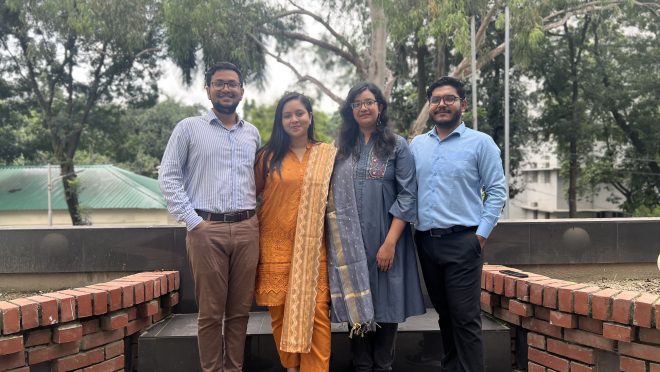The Path to the PTAK: Bangladesh wins global Supply Chain Case competition
Previously known as the Ptak Prize, it is the world’s largest case competition on supply chain management and offers scholarships totaling $300,000 to 400 Bangladeshi participants every year.
The Path to the PTAK: Bangladesh wins global Supply Chain Case competition
Previously known as the Ptak Prize, it is the world’s largest case competition on supply chain management and offers scholarships totaling $300,000 to 400 Bangladeshi participants every year.

After three rounds spanning half a year, Team Ptaktikal Experts from IBA-DU, consisting of Tasnia Azmayeen Deepi, Md Tahmeed Hossain, Rehnuma Tarannum Oishi and Kamrul Alam, secured the Global Winner title at 2023 ISCEA Prize Global Case Competition.
Previously known as the Ptak Prize, it is the world’s largest case competition on supply chain management and offers scholarships totaling $300,000 to 400 Bangladeshi participants every year.
What is the Supply Chain?
As a popular buzzword to throw around, many undergrad students have a fuzzy concept of what it actually is. It is a series of processes that begin at the inception of a product.
“It is essentially a relay race.” Kamrul said, “one that ends when the product reaches the hands of the consumer.” The smallest strategic decisions in the supply chain affects the profitability of the product.
The supply chain is part of the value chain. The value chain ecompasses the entirety of a products journey, starting with ideation in the R&D department and extending beyond the customer’s acquisition of the product through warranties, after-sales service and more.
The Case Competition
Each year the competition is held in three rounds, at the national, regional and global levels. The top 20 teams from the national round proceed to the regional round, which serves as a qualifier for the global round. This year, 10 teams from Bangladesh participated in the global round.
The case, as Deepi mentioned, was an open ideation on the energy crisis as a threat on the garments industry of Bangladesh. They had to show feasible ideas on how to invest in infrastructure and have joint performance management systems.
The regional round required them to submit a video presentation of the solution. The international round was based on the value chain of a poultry farm, which involved forecasting and solving mathematical problems
Who should participate?
The team members revealed some opinions based on their own experiences, mentioning that the mathematical problem they had to solve was intuitive and not complex, and that their academic coursework definitely helped with the forecasting. Much of the terminology could be self taught using online resources and plenty of time was given to solve the case study.
The conclusion is that any team without prior working knowledge has a shot. This year’s runner-ups being from Science and Technology universities of Malaysia and Egypt is a testament of that. Bangladesh’s success on the global round this year was not a fluke, as a team from BUET became runners-up in 2019.
The Secret to Success?
Although one’s educational background itself did not impact their results, Tahmeed accredited their success to the IBA and how it taught them to know what information to present, as well as how to present it in a clear and concise form. In this particular situation, they had to be quite deliberate in ensuring only relevant information was presented.
“At the end of the day,” he said, “it’s the practical ideas presented simply and justified rationale that make a compelling case.” The team thus focused on visual and eye catching representations instead of focusing on only the numbers involved. This emphasis on simplicity was echoed by his teammates.
The Scholarship
Scholarships are provided to the top 100 teams of Bangladesh, varying from the 100%, 70% or 60% scholarships on the CSCA (Certified Supply Chain Analyst) certification. The top 6 national teams get a full-free ride of the $1100 course.
It teaches the technical terms and a checklist to follow in any manufacturing process to maintain quality. The team, having already completed the course, mentioned that the curriculum is quite simple and can be easily juggled with academic pressure. “It unlocked a different part of my brain,” added Kamrul.
The CSCA tag gives the students an edge in the job market since the status quo is to have to train them after recruiting. The need for a robust supply chain was felt during the pandemic, and vast new job prospects followed.


